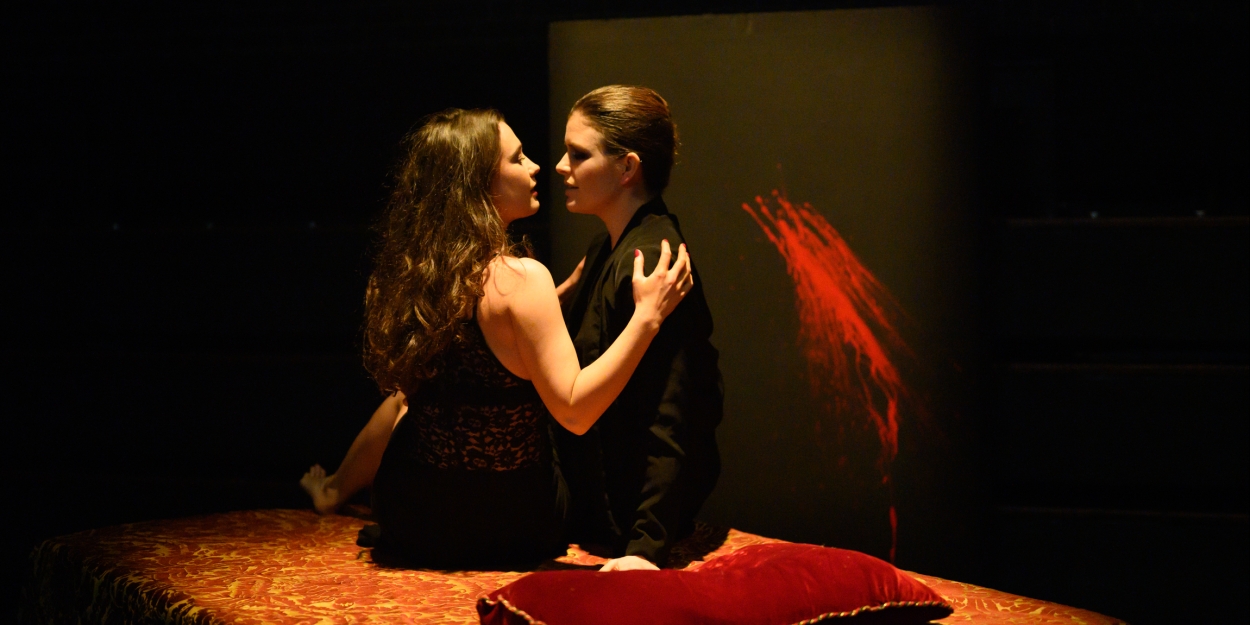Review: L'INCORONAZIONE DI POPPEA, Arcola Theatre
Controversial, mysterious and highly sensual. What's not to love?

![]() Claudio Monteverdi's L'Incoronazione di Poppea, revived here by Ensemble OrQuesta as part of the Arcola Theatre's Grimeborn season, is a highly controversial and disputed work of baroque opera which flips the script on contemporary morality. Critics have variously labelled it an "extraordinary glorification of lust and ambition", "famously problematic" and "at best ambiguous and at worst perverted".
Claudio Monteverdi's L'Incoronazione di Poppea, revived here by Ensemble OrQuesta as part of the Arcola Theatre's Grimeborn season, is a highly controversial and disputed work of baroque opera which flips the script on contemporary morality. Critics have variously labelled it an "extraordinary glorification of lust and ambition", "famously problematic" and "at best ambiguous and at worst perverted".
Monteverdi is considered one of the fathers of modern opera and this 1643 work was first performed in Venice months before his death and, with more than a fair amount of luck, it has survived to the modern day. In his early days as a composer, stage music was rarely played again once it had been performed and, hence, much of the Monteverdi's initial works were discarded.
At least seven of his operas are considered lost and even the provenance of what remains of L'Incoronazione di Poppea is disputed: the original manuscript disappeared into the mists of time and the two copies that have survived into the present diverge significantly from each other and from the libretto. Neither can be directly connected to the Venice performances and musical historians still disagree on how much of either manuscript copy was written by Monteverdi.
The story centres on the affair between Poppea and Roman Emperor Nerone, and the battle between the deities of Love, Virtue and Fortune to decide the lovers' fate. Nerone plans to marry his new amour but his ex-tutor, the philosopher Seneca, advises his ex-pupil Nerone to remain with the popular Empress Ottavia; meanwhile Poppea's husband Ottone seeks to repair their relationship before giving up and falling into the arms of his neighbour Drusilla.
Seneca's intervention backfires when Nerone orders his execution. Ottavia demands to Ottone that he murder Poppea and end the Emperor's philandering, thus adhering to the morality of the day. In a plot twist, virtue is punished and greed is rewarded: a divine intervention by the goddess Love means that the assassination fails, Ottavia, Ottone and Drusilla are killed and Poppea is left to become the new Empress.
Stage and musical director Marcio da Silva breaks with traditional renderings of this opera in two key ways. In the original text, there are no executions at the end and the three are exiled; da Silva says this is based on "(alleged) historical facts" and is "still true to Monteverdi's original intent". More impactful is the gender switch with Nerone played by Spanish mezzo soprano Julia Portela Pinon, a move which opens up new avenues of interpretation.
Helen May's Poppea is the central figure here - quite literally as she spends most of the evening lying or moving around a bed in the middle of the floor - but this is very much an ensemble piece with many of the actors taking on multiple roles. Other than the bed, two other major props are two boards which grimly tally the deaths in red paint as the story progresses.
As Seneca, Romanian bass baritone Gheorge Palcu is phenomenal. Whether wasting words on the Emperor or committing himself to his execution against the wishes of his family, Palcu's words seem to come from the very bottom of his soul. US-born countertenor Eric Schlossberg plays the crest-fallen cuckold Ottone to perfection: we buy into not just his despair but his elation of (very) new love with Drusilla. The British-Irish soprano Hazel Neighbour gives a fiery performance as the Empress Ottavia who, even when she sees the writing on the wall, fights hard to retain her position.
Da Silva never knowingly holds back on the sensuality. The Emperor is portrayed as a randy soul who enjoys the fulsome attentions of Poppea as well as court subjects; Nerone celebrates news of Seneca's death with the poet Lucano (an effusive Kieran White) and they don't hold back on the wine, song or sex. In the previous scene, Damigella (played by German soprano Anna-Luise Wagner who also plays Amore, the goddess of Love) gets very handsy with Ottavia's page Valletto. Dimmed mood lighting adds to the crepuscular feel of the events.
With his musical hat on, Da Silva's direction is spot-on in the main. Some scenes, including the climax, could have done with more tonal emphasis to bring out what the libretto hints at. The baroque instrumentation using harpsicord, archlute, baroque guitar and a couple of violins adds depth and resonance in the intimate Arcola space.
Ensemble OrQuesta's L'Incoronazione di Poppea is the longest opera in this year's Grimeborn programme - Monteverdi could easily have chucked some of this work's arias into a Venetian canal without any major damage - but it rarely lags. Whether the gender switch is more of a gimmick than an inspired choice is debatable but, while most theatres are currently packed with escapist fare, this dark and delicious production, redolent with lust and ambition, is a wonderful alternative.
L'Incoronazione di Poppea continues at Arcola Theatre until 30 July.
Photo Credit: Peter Mould
Reader Reviews
Videos

